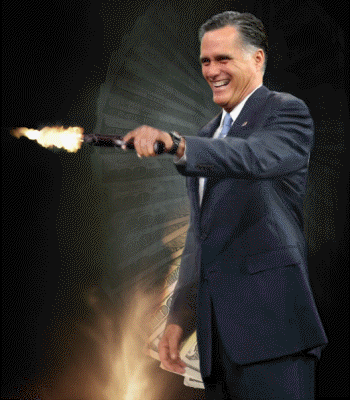Since the conventions, President Barack Obama has won the Internet—without even trying to. But the first presidential debate last night ushered in a new chapter of the election story, and things may be changing for his Republican opponent, Mitt Romney.
Obama’s been winning so effortlessly because Romney has been losing so actively.
For more than the last month, Romney has been fodder for Internet GIFs, jokes, and memes.
Most recently, Mother Jones leaked footage of Romney at a $50,000-per-plate fundraiser explaining that 47 percent of the population does not pay income tax and would never vote for him, dependent as they are on government handouts. (That is a gross misrepresentation of the facts, of course.) And that played right into a running joke online about Romney—that he’s a out-of-touch, rich, secretive fat-cat who doesn’t care about the 99 percent.
Romney has been GIFed more times than you can count (lending him more animation than you’ll ever get out of him directly). For me the most memorable is this one, portraying him as a kind of cackling James Cagney gleefully firing his handgun in front of a frenetic wad of Benjamins and behind bursts of flames. All it’s missing is the caption: “Top of the World, Ma!!!”

Thieves, claiming to have stolen Romney’s tax return, have held it hostage. Whether it’s true or not, it doesn’t really matter. It just fuels the story that Romney is an untrustworthy oligarch, whose gains were probably ill-gotten. (For the record, it was a hoax, and it didn’t work. The hackers made just $50.)
Romney has been portrayed as Lucille Bluth, cult-classic TV show Arrested Development’s version of Cruella Deville. Meanwhile, Slacktory’s editor, Nick Douglas, created Texts from Mitt Romney, a parody site echoing popular Tumblr blogs Text from Dog, Texts from Bennett, and Texts from Hillary. “It feels good to imagine Mitt as this frat-boy asshole, because I think a lot of us feel he really is, despite the clean living and the robotic persona.”
And that, right there, sums up Romney if all you knew about him was how he is portrayed online. He is somehow both boring and unfeeling, and vicious and douchey, all at once. Who would vote for that?
Not a lot of people, apparently. Romney’s been stalling on social media.
Perhaps the final word was this: A simple line of text, “Mitt Romney sucks pass it on” became one of the most popular Tumblr posts of all time, collecting 8 million notes in 24 hours.
***
By contrast, the president has been accused of partying. Nathan J. Barnatt, famous as YouTube’s Lord of the Dance, produced a four-minute tribute to the president: It’s him dancing in an Obama mask. Not exactly damning critique (but pretty entertaining).
The president also generated a lot of controversy online by being bear-hugged by a pizza joint proprietor. Sure, the restaurant’s Yelp reviews were first overwhelmed by anti-Obama commentary, but then his supporters came to the aid of the pizza parlor. But the headline was still ultimately about a guy bear-hugging the president.
Mostly, the criticism of Obama has just made his opponents look like insane, murderous racists. A Republican congressional candidate sent a picture of his gun to the president on Facebook when Obama was visiting Tennessee. Likewise, the Republican Party ordered a local chapter to remove images from its Facebook page depicting the nation’s first black president as a deadbeat and a witch-doctor.
And that’s pretty much it. Remarkably, 2008’s social media candidate—the man who made YouTube the best way to get out the vote since direct mail—has caused relatively little splash online in the 2012 election.
***
In a class once, prominent librarian and scholar Betty Sue Flowers asked us to do an exercise illustrating the power of narrative. She asked us to tell a true story three times, each time with a different underlying narrative thrust. First, we told the story as a victim story, then as a hero story, and then as a life-lesson story.
It was amazing how much the story would change each time you told it. As you went through the same period of your life, because of the type of narrative you were constructing, you’d remember different facts, each no less true than the others, but they changed everything. Flowers described it thus: The narrative is like a big magnet moving over the junkyard of your life. Each time it passed, it attracted different things.
In this election season, that’s what’s happening online. The narrative got set at the conventions when Obama gave a good speech—and former president Bill Clinton and First Lady Michelle Obama gave even better ones—while Romney got upstaged by a doddering old man and an empty chair.
Much as the Internet is a tool that gives voice to everyone independently, it can also be a thing that melds all those voices into a single voice—all those perspectives into a single narrative. And for the last month, the story has been that Romney is a frat-boy pretending to be a robot, and everyone criticizing the president is an absurdity.
And once the narrative emerges and the millions of voices merge into one, the sheer inertia of it makes it almost impossible to redirect. It takes a big, pivotal moment.
Last night’s debate may have been that very moment: “Romney won” was tweeted 3.7 times as often as “Obama won.”
Andrew Sullivan of the Daily Beast may have named the new narrative: Obama came off as “meandering, weak, professorial … effete [and] wonkish.” For his part, Romney did incite a new gleeful round of parody Twitter accounts by threatening to fire Big Bird, but I think the next 24 hours will be pivotal.
For the next day or so, every voice matters. After that, it will congeal again into one voice—a single vote. Perhaps the last before the election.
Screengrab via YouTube


